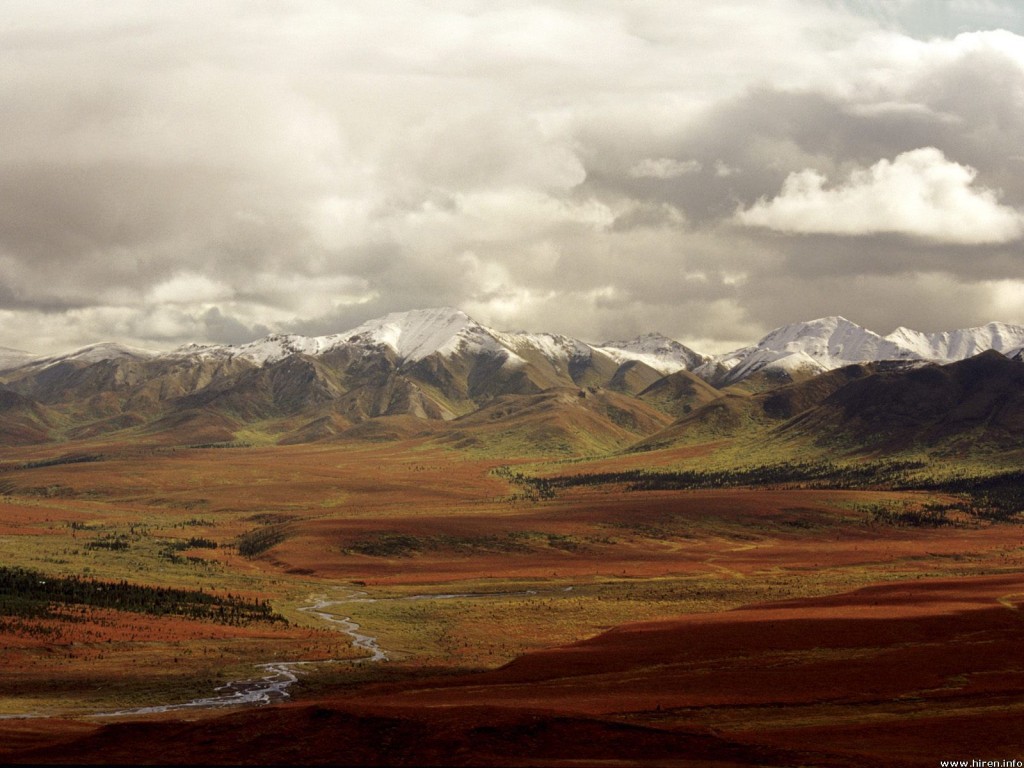Way back in the day, my family took a road trip up there; we took the ’88 Ford Club Wagon all the way, Coleman camping trailer in tow. Ah, good times.
Sadly, there’s not much I clearly remember from the trip: one or two particular vistas, a very cold night, a campground-meandering moose, so on and so forth. I only remember a few things well–most of all, the beauty.
I’m sure that if I were a better writer, I could put it into vivid prose, but all I can really say is that the beauty of Alaska is different (on the safe assumption it hasn’t changed too much since then).
There was a peculiar quality the beauty had–a sort of stillness.
It was more than audible noise though–I’ve been to beautiful places, far enough from civilization to be just as quiet as the places we visited in Alaska. It may well be my long term memory embellishing things, but I swear there was some quality of the beauty itself, this tranquility of sorts.
Now, zip forward a few years (ten, twelve, maybe more?).
By it’s nature, rural education is a risky proposition; there are so many barriers to overcome. I guess I was always aware of that to some level or another, but I never really thought about it. Than again, I never really thought about education too much till a few years ago.
Since I’ve started thinking about education (I don’t know if that happened before or after I decided to go into education–chicken or egg, if you will), I’ve been thinking about rural education. Questions began to drift into a perspective of sorts. Why, why educate kids in the middle of nowhere–will it really mean anything for them, in the long run? Should they be pushed to “escape”, get away from the sticks and “make something” of themselves? What does it really mean for a teenager in an isolated, rural area, to make something of their life?
Whenever I think of rural, I think of a few places: Alaska and Montana come to mind first. “Alaska is what America was.” It’s so pristine and beautiful–so isolated. It also consistently makes the first spot in teenage suicide rates.
So much beauty and peace, and so much emptiness and need.
Disclaimer
If I were to be moving there, I definitely would say so. I’m not moving there..yet. One never knows where all the road ahead leads.

“Why educate _____?” is a good question to ask about anyone whether rural, suburban, or urban. Another way to phrase the question, which I think puts a better point on it, is “For what purpose ought we educate _____?” The answer to this question will go a long way to determining the form of education that is used – formal schooling, apprenticeship, crazy-a** free form stuff, etc.
The problem of the brain-drain (or intellectual strip-mining) is addressed quite well in this essay on Front Porch Republic: http://www.frontporchrepublic.com/2009/05/the-decline-of-middle-america-and-the-problem-of-meritocracy/. Its long, but may prove to be a help to your thinking about learning, education, and schooling.
I have been thinking about the same issue, and I find it entirely conceivable that I might conclude after a number of years teaching that the educational system is too biased toward strip mining for an individual to do much good. For now, the main thing I need to keep in mind is not to jump to this conclusion too early. At the same time, I am also trying to develop useful skills (bike mechanic, gardening, etc.) so that I am not totally tied to a particular educational model for my own livelihood.
Yeah, I agree. There’s a lot of questions about education that have been running through my mind–rural education is one of the main ones, seeing as that’s where I’m headed next year for a while.
I definitely have been wondering, to a lesser extent (but growing), about that second question. It’s definitely a better point for the issue.
That article was very good…I need to read it again though, finals week blotted it from my memory :(. I like your game plan, I may try to copy some of it.